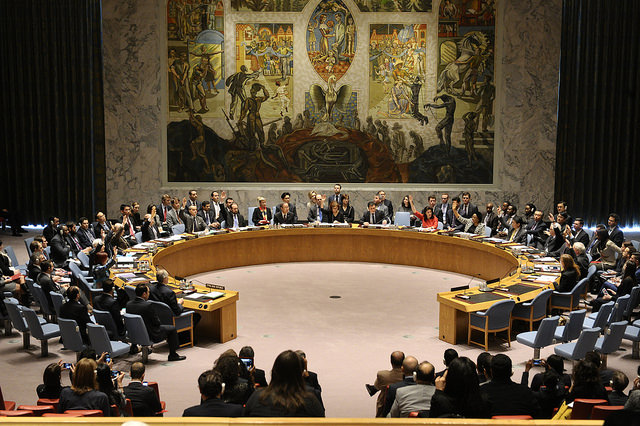
As we saw in part one of this series, this year’s UN Security Council (UNSC) elections are earlier than usual (28 June), candidates have presented their platforms in historic public debates, and two of the five seats are uncontested. Of the three remaining seats, one will go to the Asia–Pacific Group and three candidates are vying for two Western European and Others Group (WEOG) seats.
Asia–Pacific Group: Kazakhstan vs. Thailand
The Asia–Pacific Group doesn’t have any established practices for filling its UNSC seats, and this year Kazakhstan and Thailand are competing for one seat to replace Malaysia. As the only candidate this year that has never served on the Council, Kazakhstan is arguing that it deserves a turn, especially given that Central Asia has never held a seat on the Council. Meanwhile, Thailand has reminded member states that it put forward its candidacy before Kazakhstan and has only served as a Council member once 30 years ago (1985–86). Bangkok, however, may not be able to overcome concerns about its rule by military junta since its 2014 coup. During the debate on 23 May, both Kazakhstan and Thailand discussed their commitment to addressing thematic issues such as climate change; conflict prevention; non-proliferation; and women, peace, and security.
Kazakhstan has a website dedicated to its bid and has listed four priorities based on its own experiences: water security, food security, energy security, and nuclear security. In particular, Astana has highlighted its experience with non-proliferation, touting its voluntary dismantlement of the world’s fourth largest nuclear arsenal after gaining independence in 1991, leadership in facilitating the Nuclear Weapons Free Zone in Central Asia, and role in hosting negotiations related to the Iran nuclear agreement.
Thailand, endorsed by ASEAN, has stated its commitment to improving the transparency and efficiency of the UNSC and to serving as a bridge-builder between developed and developing member states and between Asia and the rest of the world. Thai Ambassador Virachai Plasai’s performance was particularly impressive during the debate—he flipped back and forth between English and French and demonstrated energy, passion, and expertise on a wide range of subjects.
WEOG: Italy, the Netherlands and Sweden compete for two seats
WEOG elections often are highly competitive, and this year is no different. Italy, the Netherlands, and Sweden are competing for two seats, leading the UK Ambassador to the UN to describe WEOG as the ‘Group of Death’ on Twitter. The victors will replace New Zealand and Spain. Italy has served on the Council six times, the Netherlands five times, and Sweden three times. During their debate on 24 May, the three ambassadors acknowledged the many similarities among their platforms, including a focus on conflict prevention; women, peace, and security; climate change; a holistic approach to sustainable development; and increased transparency in the Council.
Italy in its campaign pamphlet touts its role in peacekeeping and its position at the forefront of combatting terrorism and violent extremism. At the debate, Italian Ambassador Sebastiano Cardi differentiated his country by stressing that as the only Mediterranean candidate, it’s at the crossroads of east, west, north and south and is ideally placed to deal with the peace and security challenges of today.
The Netherlands claims on its website to be ‘your partner in peace, justice, and development’. Dutch Ambassador Karel van Oosterom emphasised that the Netherlands’ structure as a kingdom with territories in Europe and the Caribbean gives it a unique perspective, including an understanding of climate change and other issues affecting small islands. Van Oosterom also stressed his country’s goal to strengthen the international legal order and to improve cooperation between the UN and international courts based in The Hague.
Sweden notes on its website that it submitted its candidacy first, back in 2004, and hasn’t served on the Council in 20 years. While all the ambassadors gave solid performances in the debate, Swedish Ambassador Olof Skoog really shone by using stories and personal experiences to demonstrate his expertise and through his emphasis on listening and being accessible to the rest of the membership. He differentiated Sweden by arguing that it’s militarily nonaligned with a small country perspective and a voice of integrity. He also highlighted the utility of his recent experience chairing the Peacebuilding Commission.
Placing bets
As an outsider looking in, I’d hypothesise that Kazakhstan’s claim that Central Asia has never been represented coupled with concerns over Thailand’s domestic politics may tip the scales in Kazakhstan’s favour. In WEOG, if Ambassador Skoog’s performance in the debate was any indication of his lobbying skills, Sweden looks like a strong contender for one of the WEOG seats. The second seat feels like a toss-up, though the Netherlands may have an edge if it can get small island states on its side. As previously mentioned in part one, however, these races are often wildly unpredictable, and we won’t know the outcome for certain until 28 June.
Australia will have lessons to learn from this year’s elections, particularly as a member of the hotly contested WEOG. While its next bid for a seat in 2029–2030 is still a long way off, it will be important for Canberra to consider how the changes to the elections this year affect the campaign process and outcomes going forward as well as how countries leverage the extra preparation time before assuming their seats.

